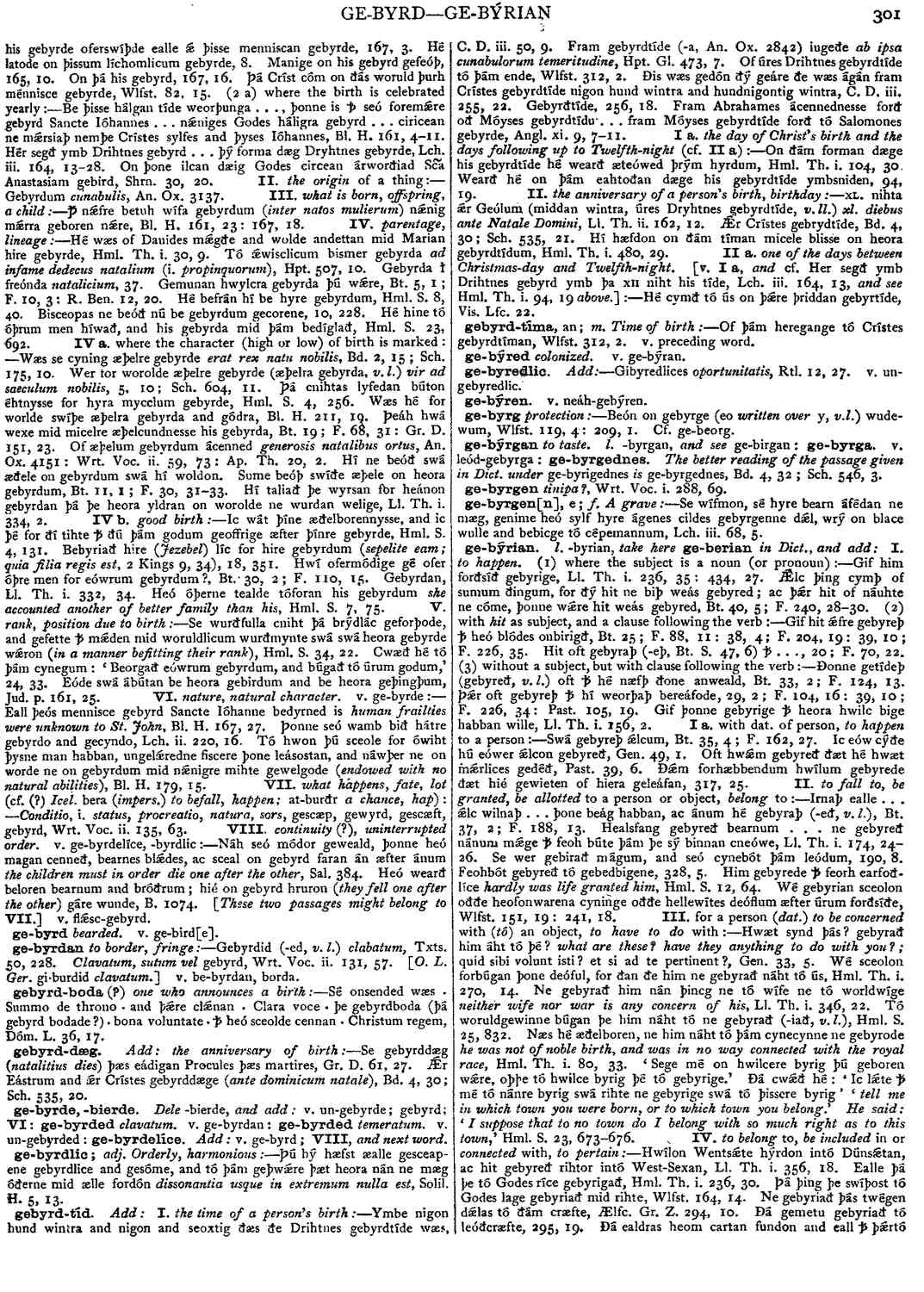ge-býrian
- verb [ weak ]
-
Gif him forðsíð gebyrige,
- Ll. Th. i. 236, 35: 434, 27.
-
Ǽlc þing cymþ of sumum ðingum, for ðý hit ne biþ weás gebyred; ac þǽr hit of náuhte ne cóme, þonne wǽre hit weás gebyred,
- Bt. 40, 5; F. 240, 28-30.
-
Gif hit ǽfre gebyreþ ꝥ heó blódes onbirigð,
- Bt. 25; F. 88, 11: 38, 4; F. 204, 19: 39, 10; F. 226, 35.
-
Hit oft gebyraþ (-eþ,
- Bt. S. 47, 6) ꝥ ..., 20; F. 70, 22.
-
Ðonne getídeþ (gebyreð,
v.l.
) oft ꝥ hé næfþ ðone anweald,- Bt. 33, 2; F. 124, 13.
-
Þǽr oft gebyreþ ꝥ hí weorþaþ bereáfode,
- 29, 2; F. 104, 16: 39, 10; F. 226, 34: Past. 105, 19.
-
Gif þonne gebyrige ꝥ heora hwilc bige habban wille, Ll. Th. i. 156, 2. I a. with dat. of person,
to happen
to a person :-- Swá gebyreþ ǽlcum,- Bt. 35, 4; F. 162, 27.
-
Ic eów cýðe hú eówer ǽlcon gebyreð,
- Gen. 49, 1.
-
Oft hwǽm gebyreð ðæt hé hwæt mǽrlices gedéð,
- Past. 39, 6.
-
Ðǽm forhæbbendum hwílum gebyrede ðæt hié gewieten of hiera geleáfan,
- 317, 25.
-
Irnaþ ealle ... ǽlc wilnaþ ... þone beág habban, ac ánum hé gebyraþ (-eð,
v.l.
),- Bt. 37, 2; F. 188, 13.
-
Healsfang gebyreð bearnum ... ne gebyreð nánum mǽge ꝥ feoh búte þám þe sý binnan cneówe,
- Ll. Th. i. 174, 24-26.
-
Se wer gebirað mágum, and seó cynebót þám leódum,
- 190, 8.
-
Feohbót gebyreð tó gebedbigene,
- 328, 5.
-
Him gebyrede ꝥ feorh earfoðlíce
hardly was life granted him.
- Hml. S. 12, 64.
-
Wé gebyrian sceolon oððe heofonwarena cyninge oððe hellewítes deóflum æfter úrum forðsíðe,
- Wlfst. 151, 19: 241, 18.
-
Hwæt synd þás? gebyrað him áht tó þé?
what are these? have they anything to do with you?
; quid sibi volunt isti? et si ad te pertinent?,- Gen. 33, 5.
-
Wé sceolon forbúgan þone deóful, for ðan ðe him ne gebyrað náht tó ús,
- Hml. Th. i. 270, 14.
-
Ne gebyrað him nán þincg ne tó wífe ne tó worldwíge
neither wife nor war is any concern of his,
- Ll. Th. i. 346, 22.
-
Tó woruldgewinne búgan þe him náht tó ne gebyrað (-iað,
v.l.
),- Hml. S. 25, 832.
-
Næs hé æðelboren, ne him náht tó þám cynecynne ne gebyrode he was not of noble birth, and was in no way connected with the royal race, Hml. Th. i. 80, 33. 'Sege mé on hwilcere byrig þú geboren wǽre, oþþe tó hwilce byrig þé tó gebyrige.' Ðá cwǽð hé: 'Ic lǽte ꝥ mé tó nánre byrig swá rihte ne gebyrige swá tó þissere byrig' '
tell me in which town you were born, or to which town you belong.' He said: 'I suppose that to no town do I belong with so much right as to this town,'
- Hml. S. 23, 673-676.
-
Hwilon Wentsǽte hýrdon intó Dúnsǽtan, ac hit gebyreð rihtor intó West-Sexan,
- Ll. Th. i. 356, 18.
-
Ealle þá þe tó Godes ríce gebyrigað,
- Hml. Th. i. 236, 30.
-
Þá þing þe swíþost tó Godes lage gebyriað mid rihte,
- Wlfst. 164, 14.
-
Ne gebyriað þás twégen dǽlas tó ðám cræfte,
- Ælfc. Gr. Z. 294, 10.
-
Ðá gemetu gebyriað tó leóðcræfte,
- 295, 19.
-
Ðá ealdras heom cartan fundon and eall ꝥ þǽrtógebyrede,
- Nic. 12, 8.
-
Sý hé þæs þeówweorces wyrðe þe þǽrtó gebyrige,
- Ll. Th. i. 164, 13: 330, 27: 342, 8.
-
Ealle gerihtu ðe him tó gebyrigean,
- 434. 25.
-
Mid ús is gerǽd ꝥ hé sylle .v. sustras tó gafole; on suman landum gebyreð máre gafolrǽden,
- Ll. Th. i. 436, 2.
- On manegum landum gebyreð deópre swánriht, 14.
-
For þám cynedóme gebirað óðer swilc tó bóte,
- 190, 7.
-
Of Dyddanhamme gebyreð micel weorcrǽden,
- C.D. iii. 450, 30.
-
Ofer eall ðæt land gebyrað æt gyrde .xii. penegas ...,
- 24. V a. with dat. of
-
Ǽhteswáne gebyreð stífearh,
- Ll. Th. i. 436, 22, 26, 33.
-
Him gebyriað .v. æceras tó habbanne,
- 432, 23.
-
Forgylde þám þe hit gebyrige,
- 410, 16.
-
Bisceope gebyreð ǽlc rihting ... Hé sceall gehádode men ǽrest gewissian ꝥ heora ǽlc wite hwæt him mid rihte gebyrige tó dónne,
- Ll. Th. ii. 312, 9-12.
-
Hyt gebyrede (
oportuit
) þæt þú befæstest mín feoh myneterum.- Mt. 25, 27.
-
Syþþan gebyreþ ꝥ man sylle ...,
- Ll. Th. i. 250, 16.
-
Sulhælmessan gebyreð ꝥ man gelǽste,
- 342, 30: 352, 16. (2 a) with dat. of person :--
-
Bisceopum gebyreð ꝥ ..., ii. 316,
- 11, 22, 26.
- Gebyrað, 34.
-
Se geleáfa þe ǽghwylcum men gebyreð ꝥ hé wel gehealde,
- Bl. H. 111, 13.
-
Gif hé teám gecenne, and sý on óðre scíre séþe hé tó týmð, hæbbe hé swá langne fyrst swá þǽrtó gebyrige,
- Ll. Th. i. 288, 19: 308, 11.
-
Godes lagum fylge man and láreówum hlyste, swá þǽrtó gebyrige,
- 332, 27.
-
Beón þá heregeata swá hit mǽðlic sý. Eorles swá þǽrtó gebyrige, ꝥ syndon eahta hors ...,
- 414, 5.
-
Ðætte hé ǽghwelcum men finde ðone lǽcedóm ðe him tó gebyrge
ut congrua singulorum vulneribus medicamina opponat.
- Past. 453, 13.
-
Nán gebeórscipe ne gebyrað æt líce, ac hálige gebedu þǽr gebyriað swýþor,
- Hml, S. 21, 316.
-
Sé þe ꝥ nelle, ꝥ his háde gebyrige,
- Ll. Th. i. 306, 22.
Bosworth, Joseph. “ge-býrian.” In An Anglo-Saxon Dictionary Online, edited by Thomas Northcote Toller, Christ Sean, and Ondřej Tichy. Prague: Faculty of Arts, Charles University, 2014. https://bosworthtoller.com/47408.
Checked: 0